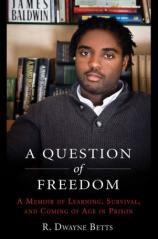Reading Group Guide
Discussion Questions
A Question of Freedom: A Memoir of Learning, Survival, and Coming of Age in Prison

1. Which incident in the book shocked you the most and why?
2. What is the question that Dwayne is referring to in the book’s title?
3. Dwayne writes, “I thought there was an imaginary line that would keep me safe. If I stood on corners but didn’t sell crack I’d be okay” (p. 10). What does he mean? Do you think many people incarcerated today believed they would wind up in prison?
4. “It reminded me of what I thought a gun in my hand said about power. How something that weighed next to nothing in my palm added a ton to the tenor of my voice, made every word I said matter” (p. 21). Is that moment of power worth the risk one is ultimately taking? If not, why do so many take it?
5. “No one said that we were all locked up because of what filled the lyrics of rap songs. I didn’t say it either. I thought about it sometimes, when the radio was on and I nodded to somebody rapping about who they were going to shoot and when” (p. 54). Is it rap music lyrics that inspire violence or is it the violence that inspires the lyrics?
6. Dwayne spends some time “doing the knowledge” (p. 113) with a group of Black Muslim inmates but returns Rashid’s Quran after taking the Muslim name, “Shahid. The witness” (p. 122). Why does he choose this name at the same time that he rejects their beliefs?
7. “That’s how it was, get picked up for truancy or a fight and the next thing you knew half the people you’re tight with were locked up or had been locked up” (p. 149). Are violence and illegal behavior like viruses that infect those in contact with it?
8. Dwayne’s grief-stricken mother is a silent but constant presence. How does this relationship affect Dwayne while he is serving his time behind bars and once he was released?
9. Early on, Dwayne makes a decision to accept personal responsibility for his actions rather than blaming the violent, racist society in which he was raised. Is this the only path to redemption? What is society’s responsibility towards Dwayne and others like him?
10. Even before Dwayne goes to prison, he is a voracious reader but admits, “I’d never talked about one book I’d read with my friends until a cell door closed behind me” (p. 153). Why would someone who so obviously loved books keep his reading a secret?
11. While writing a letter on behalf of a fellow inmate who was trying to dispute the bogus case against him, Dwayne realizes “the thing was, most of us didn’t have the skills, the basic grammatical skills to put together a letter that would make someone want to help” (p. 166). Where does the blame for this deficiency lie: the educational system, parents, or the individual?
12. What did you think of the manner in which Dwayne and his fellow inmates were treatment in the aftermath of 9/11? Do you think that the descendents of slaves—especially if they are also incarcerated—should be expected to feel patriotism?
13. Were you surprised by the fact that Howard University refused to honor the scholarship that Dwayne earned because he was a convicted felon? Or by Mr. Wescott’s decision to accept Dwayne as an intern at The Atlantic even though he’d once been the victim of a carjacking himself?
14. Dwayne explains that he wrote this book “and hope[s] in the small moments someone will remember what you say and put the gun down” (p. 96). Do you think he succeeded?
A Question of Freedom: A Memoir of Learning, Survival, and Coming of Age in Prison
- Publication Date: August 6, 2009
- Hardcover: 256 pages
- Publisher: Avery
- ISBN-10: 1583333487
- ISBN-13: 9781583333488







